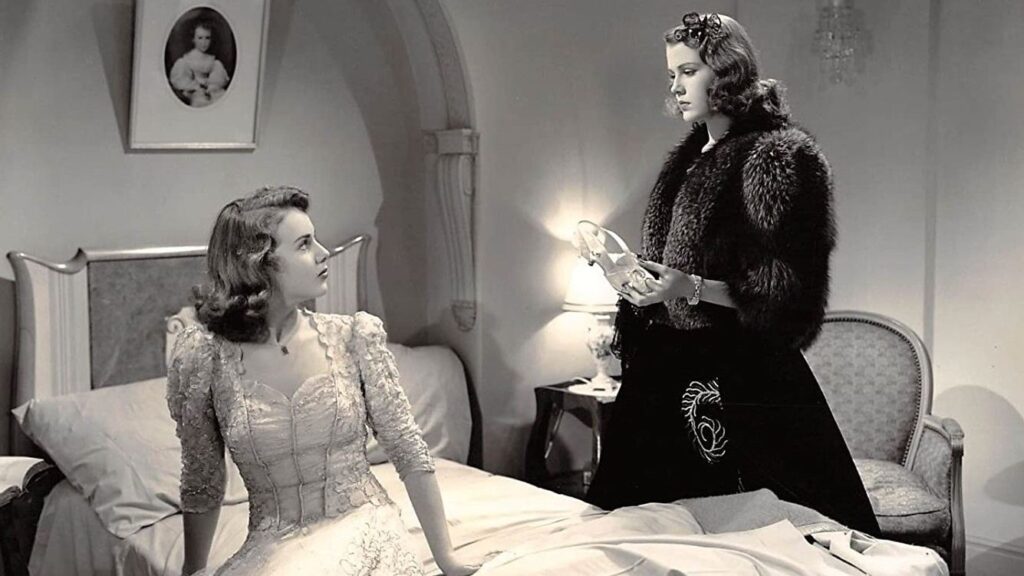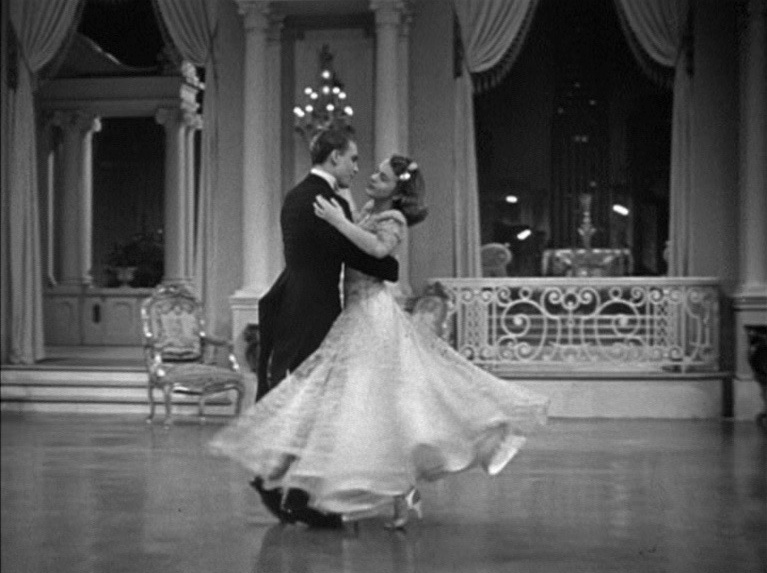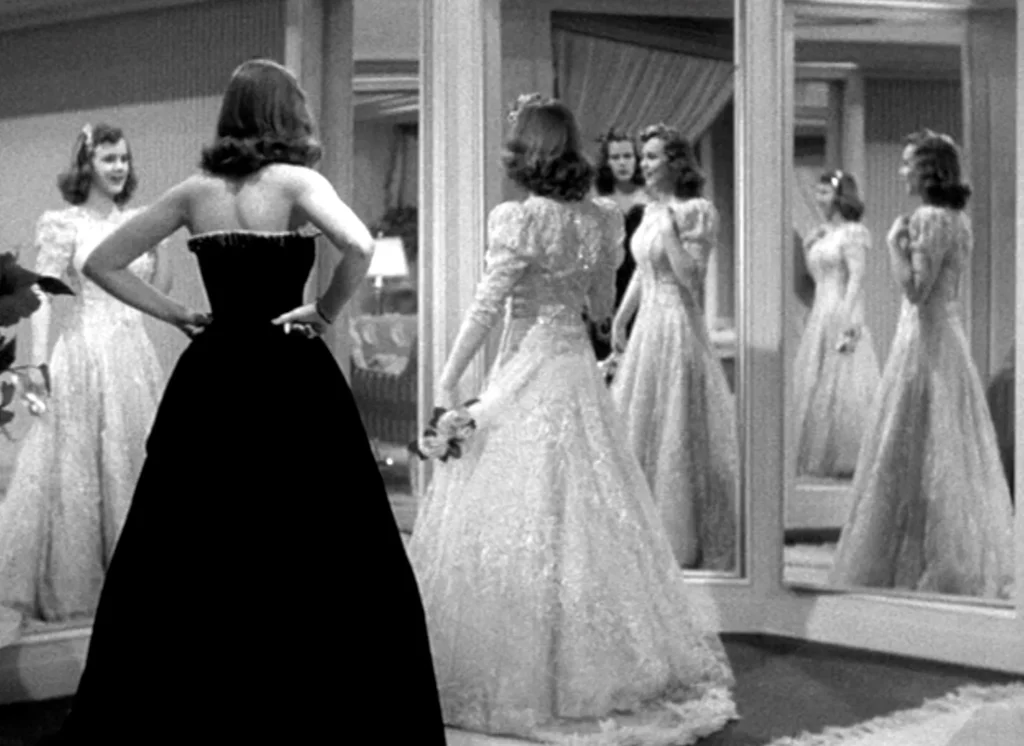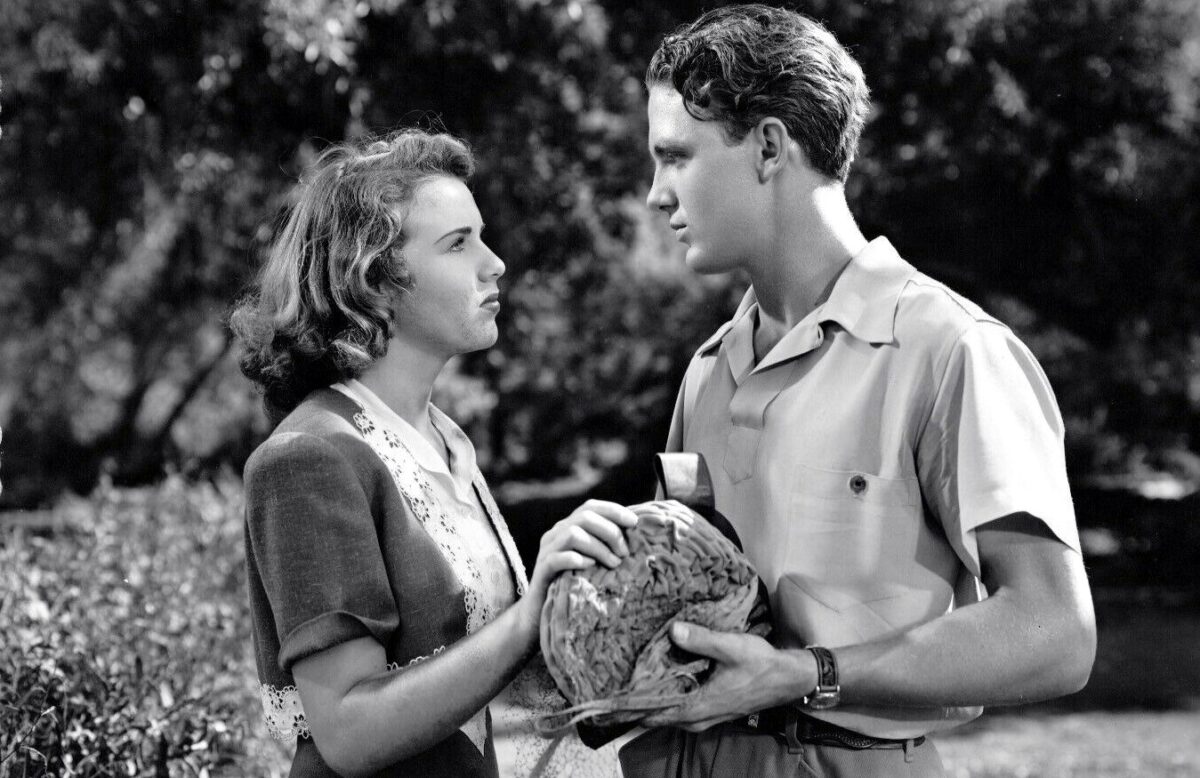Sliding doors and glass slippers
It’s not impossible to imagine a world where Deanna Durbin and Judy Garland swapped careers. Both actresses emerged as generational musical talents in the mid-30s. Both received the now-retired Kiddo Oscar i.e. the honorary Academy Juvenile Award for great child performers; in fact, in consecutive years. (Also, nobody has ever called it the “Kiddo Oscar” before I typed that previous sentence.) But in 1939, Durbin appeared in a gentle, small-scale, modestly successful Cinderella riff for Universal. Garland’s 1939 output was a bit more consequential. The rest, as they say, is history.
Durbin is a name that’s pretty new to me, but she was a big deal in the ‘30s as a musical headliner. In the ’40s, her attempts to transition out of the teen-sweetheart archetype stumbled when she appeared in two films noir that were financial failures, Lady on a Train and Robert Siodmak’s Christmas Holiday. Ironically, those are the two titles that most keep her alive for 21st-century viewers, as noirs remain more popular than ‘30s musicals. But Durbin took them as a sign the public preferred her as a sweet singer to a femme fatale; she made a couple more musicals, and then said “that’s my cue,” retiring after 1948 and never looking back. She never appeared in another film, and made exceedingly few interviews and public appearances. No nostalgic cameo, no comeback album, just 65 years of private life in France with a producer husband and a hard boundary between person and persona: In her few later interviews, she referred to “Deanna” as a third-person character crafted by studios. Durbin passed away in 2013 at ninety-one. If First Love is any indication, it’s a shame for audiences that she cut her career so short, though I can’t begrudge her a quiet life. The camera liked her a lot, and she knew how to make it like her back.

First Love is an extraordinarily winsome little comedy sprinkled with diegetic musical numbers, all sung by Durbin. We begin the film in fish-out-of-water mode: Constance “Connie” Harding (Durbin) leaves boarding school and lands in Manhattan luxury, moving into the mansion of her rich relatives, the Clintons. The social calendar goes through both Aunt Grace (Leatrice Joy) and cousin Barbara (Helen Parrish), both casually selfish in different ways, but neither cruel. Aunt Grace is super into astrology, predating the TikTok trend by 85 years. The whole lifestyle is financed by cantankerous Uncle James (Eugene Pallette). Connie’s background and humility tie her with the downstairs crowd: She bonds with the staff immediately. Upstairs, she’s treated as a charity case who can be asked to do a couple chores here and there.
Enter a love interest: Barbara’s not-quite-boyfriend Ted Drake (Robert Stack), a handsome polo prince. Connie is quickly smitten, but Barbara is territorial and senses the threat. The plot obligingly announces a society ball where everyone will be wearing their feelings in addition to overpriced gowns. The Clinton estate workers, who’ve adopted Connie as their scrappy mascot, become the collective fairy godparents, while Aunt Grace and Barbara box Connie out. Up to this story midpoint, the movie plays like a class-conscious screwball romcom with a very generous spirit.
Then the Cinderella kicks in properly. A borrowed limousine becomes the pumpkin carriage; the script contrives a midnight deadline; a crowded ballroom becomes a stage for Connie’s elegance; and a mix-up allows her to sing in front of the crowd and win the hearts of both the masses and of handsome Ted, who doesn’t recognize her. When he asks her to dance, the movie indulges its best romantic flourish: editor Bernard W. Burton and cinematographer Joseph A. Valentine sneak in a lovely trick, easing us into shots where the background extras vanish, leaving just Connie and Ted in a private, swooning swirl like, well, the ballroom dance in Disney’s Cinderella eleven years later. It’s a lovely, sweeping moment of romantic grace.

Tonally, director Henry Koster keeps everything feather-light right up until the finale. The film’s late swerve leans briefly into meanness: a burst of punitive cruelty comes from Barbara, when she fires the whole staff in retribution for helping out Connie. A scene later, a disciplinarian outburst comes from Uncle James, whose corporal punishment of the rest of the Clintons clangs loudly to 2025 eyes and ears. It puts the film in a bit of a sour mood as the credits roll, but not enough to eliminate the charm of everything leading up to it.
Durbin carries the film with ease, both in screen presence and musical performance. She has a centered sweetness that isn’t too saccharine, and a comic lightness that lets little jokes land without flash or flop sweat. The film deliberately avoids most artifice or diegesis breaking, highlighting that this is “really” Connie singing. Frankly, her voice is almost too good for this design to work: When she starts belting like she’s in Radio City Music Hall, it diminishes the character’s humble trappings and personality. (Take this observation with a grain of salt, though; I’m one of the rare people who actually likes that Emma Stone and Ryan Gosling aren’t world-class vocalists in La La Land.)
As for the fella, Stack makes a perfectly agreeable statue to admire. It’s his screen debut, and you can already detect the immaculate hairline, linebacker jaw, and velvety voice that will someday warn us about Unsolved Mysteries and become a point of parody as Captain Rex Kramer in Airplane! As Ted, Stack is amiable, a little blank, and exactly the kind of boy a Cinderella story requires. (I now realize I have not reviewed one of my teenage guilty pleasures, Hilary Duff’s A Cinderella Story, or else I’d link to it here.) My favorite supporting role comes from Pallette, with a terrific fog-horn bass and permanent air of indigestion as a grumpy uncle with a heart of gold. Credit goes, too, to Parrish, who prevents Barbara from becoming a harpy-ish step-sister, though this makes her evil turn in the finale even more jarring.

On the craft side, Universal gives the picture a polish that belies its modest stakes. The art department dresses the Clinton house like a palace (the film nabbed an Academy Art Direction nomination), and Valentine’s black-and-white photography flatters the cast’s handsome faces and the glistening beauty in the ballroom. I’m fond of a living mirror effect wherein Connie has a soul-searching conversation with herself.
Koster’s direction isn’t fussy: clean blocking, a preference for medium shots that let Durbin and cast play to the room (except the close-up singing), and just enough camera glide to avoid either stodginess or showiness. Producer Joe Pasternak, known early in his career for his collaborations with Durbin, guides the film. He and Durbin were especially anxious about nailing this film’s careful escalation of Durbin’s sweet-kid image: It includes her first-ever on-screen kiss. Universal reportedly searched high and low for the right boy; Stack won the glass-slipper casting call, and their chemistry isn’t a lightning bolt, but it’s fine.
If Garland’s 1939 offered a rainbow-crossing pop-culture monolith, a turning point in the history of cinema, with The Wizard of Oz, Durbin’s First Love is merely a pleasant diversion and continuation of a familiar template. I’m convinced both could have nailed the other’s role that year. All reporting indicates that Hollywood viewed them as two similarly talented and lovable girls-next-door with huge voices, born less than a year apart — the big difference being their actual voices, with Durbin a soprano and Garland a contralto. But maybe not. Maybe Garland was always destined for eternal legend and tragedy, with Durbin’s sputtering career and exodus from Hollywood inevitable. Whatever the truth, this is where we ended up. First Love is a charming class fairy tale, a coming-of-age story, and a musical showcase. As a Durbin primer, it’s persuasive, too. And as an 84-minute sit on a slow afternoon, it’s exactly the kind of “winsome little comedy” that earns the right to invoke that timeless fairy tale of first love.
Is It Good?
Good (5/8)
Dan is the founder and head critic of The Goods. Follow Dan on Letterboxd. Join the Discord for updates and discussion.


5 replies on “First Love (1939)”
“noirs remain more popular than ‘30s musicals”
And just look at where it’s got us, right?
At least it gave us an intellectual grounding for coping with an all-too-often broke down and morally grubby world…
@Hunter: 😭
@ED: “the stuff that dreams are made of” indeed
Reading this article, one cannot help but suspect that Ms Durbin was the lucky one – immortal fame and a loving fan base is all very well, but at such cost to one’s peace of mind and capacity to enjoy such success?
Sadly, not every child star will grow up to win the Shirley Temple award.
Yep, I imagine Durbin’s years were peaceful and happy compared to Garland’s. Like the recent Babylon explored, the industry of making great art often chews up and spits out its talent.